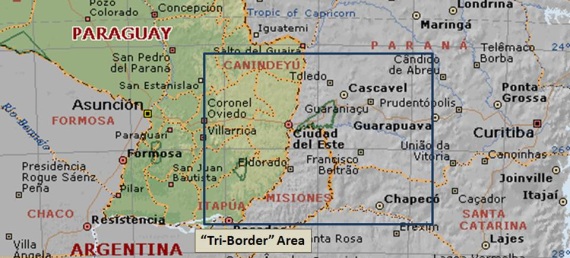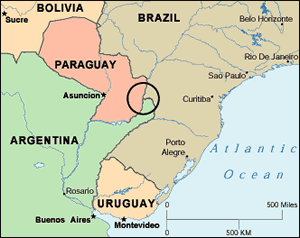How to Spot Bogus “The Jihadists are Hooking up with Latin American Drug Cartel” Stories
Since 9/11 there has been a steady trickle of stories about jihadists hooking up with Latin American drug cartels and the like. Here is a guide of story points that can help you identify when such a story is almost certainly bogus.
 Both the comment section to my post about Arizona crime stats and the problematic story about alleged Hezbollah links to Tijuana drug traffickers have inspired the following handy-dandy guide to spot bogus tales of how Islamic terrorist groups are hooking up with Latin American drug cartels.
Both the comment section to my post about Arizona crime stats and the problematic story about alleged Hezbollah links to Tijuana drug traffickers have inspired the following handy-dandy guide to spot bogus tales of how Islamic terrorist groups are hooking up with Latin American drug cartels.
It is worth noting that there have been, since 9/11, a number of stories/speculative pieces about the potential usage by Middle Eastern terrorists of Latin America as a place to plan and launch attacks on the United States. These stories (like the Hezbollah one above) tend to be taken very seriously in some quarters (see, for example, here, here and here and there are plenty more examples if one wishes to look).
The thing is: there has been zero credible evidence of any Middle Eastern/jihadist/whatever you want to think of groups establishing any kind of serious ties in the region, let alone a base of terrorist operations in a way that would threaten the US.
If one has been paying attention to these stories over time (and I have), one will notice a few key elements that are all red flags that indicate that the stories are almost certainly bogus.
1. No legitimate or known source/very thin sourcing. These stories are always very thinly sourced (at best) and usually instead of referring to an actual report, refer to a report of a report (the news equivalent of “my friend heard from a guy…”).
For example, in the “Hezbollah in Tijuana” story, the source is an unnamed, unlinked Kuwaiti newspaper. This, alone, should be enough to tip one off that the story is bogus. If the Mexican government had, in fact, broken up a ring of Middle Eastern terrorists working with a Mexican drug cartel, one can rest assured that some news outlet a bit closer to the event than Kuwait would have found out about it.
2. It mentions the Tri-Border Area. One of the great bugaboos in these stories is the famed (if not infamous!) “Tri-Border Area” (the TBA) where Argentina, Brazil, and Paraguay come together. There have long been legitimate reports of drug trafficking, money laundering and other organized crime there. There are also some Lebanese immigrants in the region and some evidence, dating back roughly a decade, of Hezbollah fund-raising in that community. It is worth remembering that Hezbollah often solicits funds. and not just for violent purposes (although yes, money being fungible, charitable contributions for Hezbollah’s social programs means more money for guns, too).
Now, there are clear illegalities taking place in this area, especially in Paraguay where the state is especially weak. However, despite over ten years of hand-wringing about the region’s potential for being a hotbed of radical Islam in the Western Hemisphere, there has yet to be any serious evidence to back the claim.
Yes, it sounds rather ominous (and even has an acronym!) but again, long-term concern has never translated into serious evidence of a threat and usually these stories simply refer back to a previous story that mentioned the TBA which, in turn, references back to an even older story, which notes how people have been concerned about the TBA for some time.
BTW, issues about the TBA stories themselves aside, the geostrategic usefulness of this area as a place to launch attacks on the US is pretty small. After all, it is a rather long way away and getting from the TBA to the US isn’t exactly a snap.
3. It Mentions Alleged Hezbollah Bombings in Argentina. The only real examples of events linking the region to the Middle East are the 1992 bombing of the Israeli embassy in Buenos Aires and the 1994 bombing of a Jewish center (also in Argentina). These bombings have been linked to Hezbollah, although I am not sure that definitive proof of said link was ever established.
Now, serious as those events were, I would hasten to point out two data points: 1992 and 1994, also known at 18 and 16 years ago, respectively. One need not be an expert in international terrorism or a highly trained social scientist to recognize that those events were a long time ago. Further, these were not new, broadly cast terror attack, but rather extensions of the conflict with Israel.
Still, the main point remains: it is highly problematic to use incidences that are near two decades in age as evidence of the imminent danger of a drug cartel+jihadist nexus.
At any rate, keep this guide in mind, as I think you will find that these stories typically have one or more of the above-mentioned problems.





Is you point “rest easy … the border is under control”?
Should be “who the hell knows what’s coming through that damn border … reason to be concerned.”
http://libertyatstake.blogspot.com/
[For a light hearted take on our present peril]
*sigh*
I would think that the point is quite clear: despite a lot of hysteria, there is no evidence whatsoever that Islamic terrorists are coming over our southern border. Nor are they camped out in Latin American making nefarious alliances with drug cartels.
I live in Brazil. All of the time that I read anything about the tri-border area is in some American website, almost *never* in Brazilian, Argentinean and Paraguayan websites or articles. But, if the problem are terrorists from there, then the problem is not the border in Arizona. Most Brazilians that travels illegally to the US settle in New Jersey, Florida, California and Massachusetts, not Arizona.
And that complicated because among the millions of people of Lebanese descent in Latin America(Almost all of them Christians) there were always some support for Hezbollah. Anyway, good article. Who wrote it really can read Spanish.
I find something tiring to see Americans that can not read any language other than English saying to foreigners what they should do(Walter Russel Mead is a particularly. pathetic example)
a lot of hysteria
If you were to remove the hysteria, it would quickly become apparent that the “Palin agenda” is vaporware…
If you were to remove the hysteria, it would quickly become apparent that the “Palin agenda” is vaporware…
If you were to remove the narrative, it would quickly become apparent that the “Obama agenda” is all hype and no help. At least Palin has testicles. Obama has Matthews.
Another edition of “I Know You Are But What Am I,” Juneau? Weak.
Sorry Juneau, you have long since proven yourself as someone who cannot hold an intelligent conversation. Why don’t you tell us again how all actors can do is pretend to be other people and how Paul Newman was not a liberal?
Also, being stupid and bull headed does not equate to “testicles” . Bush proved this rather conclusively, and we will continue to pay for that little lesson for many years to come.
Since there haven’t been any non-bogus stories about jihadists hooking up with drug cartels and sneaking across the border, I think the most obvious clue that a given story is bogus would be:
1. The story is about jihadists hooking up with drug cartels.
Followed closely by:
2. I read about it on Michelle Malkin’s site.
@Steven L. taylor:
*sigh*
Basing your argument on a negative, when the state of the situation is uncontrolled chaos, amounts to burying your head in the sand.
http://libertyatstake.blogspot.com/
[For a light hearted take on our present peril]
@LibertyAtStakes:
After all, who needs actual evidence to make policy, right?
Or … who needs a doomsday scenario to be enacted in order to actually secure one’s border.
Or, are you in fact purporting the border is in fact secure? In which case, you are a waste of my carbon dioxide.
http://libertyatstake.blogspot.com/
[For a light hearted take on our present peril]
Yes, we should make all public policy based on doomsday scenarios.
Answer the real question: do you purport the border is secure?
http://libertyatstake.blogspot.com/
[For a light hearted take on our present peril]
You do realize that the post was not about whether the border is or is not secure, but whether there is a legitimate threat from Hezbollah/Islamic radicals, yes?
Clearly, it is possible for persons, primarily migrant labor, to cross the border. In that sense, it clearly is not “secure.”
However, I have my doubts that it can be “secure” in the sense that you are suggesting (or seem to be suggesting). Indeed, it really isn’t that simple of an issue.
Regardless, I will reiterate: that was not the point of the post.
You may it’s not the point of the post, but it is THE POINT of the policy debate.
Have a nice evening.
http://libertyatstake.blogspot.com/
[For a light hearted take on our present peril]
No, its a simplistic reduction of a complex problem to a single word.
Dr. Taylor, you’ve apparently spent way too much time protected from the imperatives of the real world within the cloistered walls of academia. Reducing problems into manageable pieces, then prioritizing, then acting, them measuring, then acting again, is how people who DO things for a living solve problems.
btw – Havin’ a ball with this silly “who gets the last word game.” How ’bout you?
http://libertyatstake.blogspot.com/
[For a light hearted take on our present peril]
Not especially, but I do like the cliched “attack the academic” response.
As I enjoyed your cliched “it’s too hard for you to understand” response.
Your move.
http://libertyatstake.blogspot.com/
[For a light hearted take on our present peril]
That’s not what I said. I said that the situation cannot be reduced to a single word. I never said it couldn’t be understood.
If you want to keep this up, it might be useful to actually address things I have actually said…
Uncle. The silliness is finally crushingly boring. (Depending on what the meaning of ‘is’ is of course!) I do think this thread will make it into the book, though. Thanks for playing along.
http://libertyatstake.blogspot.com/
[For a light hearted take on our present peril]
I win. Last word. Three day rule.
Have a nice weekend.
http://libertyatstake.blogspot.com/
[For a light hearted take on our present peril]